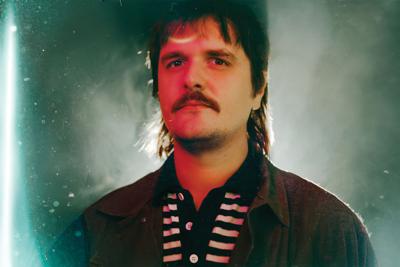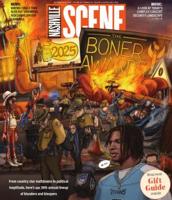
Rich Ruth
One fitting descriptor for Water Still Flows, the third studio LP from Rich Ruth — the instrumental project of Nashville multi-instrumentalist Michael Ruth, who uses his middle name for this body of work — is “oceanic.” The album is expansive in both sound and vision, and it moves between its calm and tumultuous moments with the kind of grace you expect from something vast and ancient. Observed from a distance, it has a consistent heartbeat, but when you get close, it’s roiling and boiling. Comparisons to a river also work, since Ruth and his collaborators carve out paths in the sonic texture like the Colorado cutting through the sandstone slowly and deliberately to form the Grand Canyon.
We caught up with Ruth ahead of the Water Still Flows release on June 21 via Third Man and the release party the following night at The Blue Room. When not touring with his own band, Ruth has been on the road as a member of stellar Kentucky singer-songwriter S.G. Goodman’s band. With a hefty chunk of van time in front of him, he decided to take a deep dive into metal, both familiar and new to him. Ultimately, that shaped the palette of Water Still Flows, which has a much lower center of gravity than its predecessors Calming Signals and I Survived, It’s Over.
“I’d just be listening to Carcass and Obituary and Darkthrone and things like that,” Ruth tells the Scene. “And then also reexamining a lot of the doom- and drone-metal stuff that I’ve been into for years, like Earth and Boris and Sleep. And then as that was happening, I was kind of acquiring more and more weird vintage amps and a lot of fuzz pedals. And I finally figured out how to multitrack all these heavy, down-tuned guitars, and then I just started combining that with weird samples and sequences and things like that.”
From there, Ruth sent out these heavier sounds to his cross-country collaborators — a roster including all-star psychedelic harpist Mikaela Davis, deep-listening drummer Reuben Gingrich, spirit-guiding saxophonist Sam Que, wide-ranging violinist Patrick M’gonigle and man of (pedal) steel Spencer Cullum — for an examination of the space between electrons. Each brought their unique tonal language to the affair, recorded at his Nashville home studio, and yet the group’s communication is fluent and fluid, creating a continuity of vibe.
“I’ve never gone into making a record with my own music having much of an idea beforehand of what it’s going to be or what it’s going to sound like,” explains Ruth. “It just kind of reveals itself as I find inspiration and go. And it’s just kind of like, when I have the time and energy and I’m home and can be in my studio, it’s just sort of a daily practice of just going in there and experimenting and just seeing what happens.
“Eventually those things add up, and I start bringing in other people to add their voices and see what happens. I never really tell ’em what to do or give them [many] parameters. It’s always exciting to just see what really talented musicians decide to do over something that’s fairly simple or ethereal or open-ended. And then that provides a new throughline path that I can follow. And then I do that 40 times with different things and then start narrowing all that down to something that feels cohesive as an album.”
The end result is a record that could have crash-landed from outer space, hitting half the section in the record store marked “For the Heads” on its descent. From the kosmische oscillations of album opener “Action at a Distance” to the evocative ambience of “God Won’t Speak,” from the gut-rumbling “Aspiring to the Sky” to the glacial saxophone synthesis of album closer “Somewhere in Time,” Ruth and company weave a soundscape that’s easy to lose yourself in. Even in its heaviest movements, Water Still Flows feels nebulous and ethereal. Each instrumental performance navigates deftly around expectations, never getting pulled into the eddies or beached on the shoreline.
“I’ve just been reverse-engineering these tracks to try to perform live, and then that becomes something completely different because there’s no point in trying to re-create this stuff verbatim — it’d be impossible,” Ruth says. “So now it’s become this sort of jam-band mentality, of just like, ‘Here’s the theme, let’s see what happens.’ And it’ll change every night.”
The approach opens up profound possibilities when brought to the stage; you can hear that for yourself on 2023’s Live at Third Man Records, recorded at the release party for I Survived, It’s Over. With so many styles and their social context woven into the music (Doom metal! Experimental electronic art music! Jam bands! Jazz!), it could be easy for the meta-ness of it all to overwhelm the music. Ruth doesn’t fall prey to that, in part by simply committing to the coolest possible sounds and giving his colleagues wide latitude to create in response to them.
“It’s just about finding a collective zone and inhabiting it as sensitively — and maybe aggressively — as possible. It just depends on what moment we’re in."








